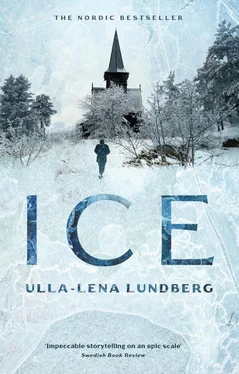One of the others is apparently Gustaf Sörling. The pastor chimes in. “Yes, my guess is that there’s more talent here than most places. And it’s true that all too few get the help they need. Maybe he feels the same way and wants to show his gratitude.”
Fridolf has heard the end of this conversation and walks over. “We’re from the same family by way of my mother’s father’s father,” he says. “I can tell you from the time he was a little kid you could see he was a different calibre. So there aren’t so many of us here who could have done what he’s done.” His wears his family tree well, and he gives Sörling a kindly look. “We’ve done well this evening. You can put on a suit and go to Mariehamn and talk to builders. You’re good at talking.”
“And let’s hope you’re good at building,” Sörling says. “Seeing you’ve been in America and built things for Rockefeller.”
“Yes indeed,” says Fridolf. “There have been no complaints about those buildings.”
The pastor and Doctor Gyllen gather up their papers and walk towards the western group, where Adele Bergman’s voice rings out more sonorously than the pastor has ever heard it, and where the organist can be heard in the background, still under pressure, explaining why he didn’t want to be elected. “These are new times, and at some point we have to start thinking more about the individuals than about the relative balance of power between the villages. As it is, we’ve got the most qualified people, and I’ve been spared yet another job.”
“Well said,” the pastor says as he joins the group. “And isn’t it fun to spend other people’s money for a change. This evening really warmed my heart.”
Politely, they turn to him and Doctor Gyllen, who remains a little in the background. No one really wants to go home, not even the pastor, who has the farthest to go. He had to ride his bicycle around the whole island in the pitch dark. Longingly he looks out the window. “If I had my own motorboat it would save me a lot of time.”
“Wait till it freezes over,” Sörling says. “You’ll see what a short trip you have. If it’s clear ice, you can skate. Otherwise a kicksled.”
“But I don’t have time to wait for that now. Brr, it’s really cold tonight. Now what did I do with my scarf?” He says good night to those around him and out to the whole room in general, wraps himself up as best he can and goes outside. It is November fifteenth, cloudy, only a couple of degrees above freezing, so dark that he has to stand still for a moment before he can see his bicycle where he leaned it against the corner of the building. The Petromax lamp shines brightly inside the school, but he can’t see a thing outdoors. He has to walk his bike through the gate so he won’t ride into it. Out on the road, he swings up and starts to pedal, and then the dynamo whirs into life, a scraping sound like a locust. Now he can see enough to stay on the road at least, and thank God everyone has taken in their cattle, so the gates are open and he doesn’t have to worry about riding into a cow lying in the road. When he picks up speed and pedals down the east village hills, his own dynamo also kicks in. It spreads warmth and builds a fire under his bass voice so that it starts to sing. He is a vehicle with a motor, central heating, and the radio’s evening concert. So equipped, he travels through the night, pleased to be alone, pleased at the thought of arriving home soon to warmth and light.
FATHER LEONARD HAS A HARD TIME tearing himself away, stubborn as a child at bedtime, but now he’s coming. Brings his bicycle on the boat along with two big suitcases and a certain method behind the contents, which consist of a great deal of dirty laundry. Innocently he pours the entire load out on the floor. Petter is angry but Mona is triumphant—just what I expected! There is something about Leonard that dissolves a person in smiles. Mona and her father-in-law are absolute opposites, but she puts up with him, and he admires her, so it could be worse. At their very first meal, Petter feels transported back to the home he believed he had left behind him for all time. His father talks a blue streak, speaks with authority of things he knows nothing about and with astonishment about things that ought to be well-known to him. Meanwhile he eats methodically, and then comes the formulaic “This was good, Mother, I must say.” Then they all stand up, and father offers his help by fetching water, taking out the slop bucket, and carrying in wood. Mona thanks him kindly and says it was nice of him, because this way Petter can concentrate on his pastoral dissertation. And it’s true that the house seems homier when he sits in his study and can hear Papa in the distance commenting on the newspapers while Mona carries on with her work. Maybe it really will work out. He sincerely hopes so.
Leonard spends the night in the preacher’s guest room, where he will live until some actual travelling preacher appears. He feels better when he’s among other people. When he’s alone, his sighs echo through the room and his body tosses and turns on the groaning springs of his bed. Even if he’s out of sight, no one can forget that he is a martyr to the rheumatism that makes his jaws creak, and to a bad stomach and to pain between his shoulder blades. That first evening he walks from window to window and notes that you can’t see a single light from the parsonage, only the lighthouse, which blinks but bears witness to the presence of no living being.
That makes him think of America and the snowstorms on the prairie. He suggests that they rig a line from the parsonage to the cow barn so that Mona doesn’t get lost in a blizzard where a person can lose her sense of direction and location in no time flat. Many people have missed the corner of the house by a metre or so and frozen to death on the prairie, helplessly, only a hundred metres from home. Mona laughs heartily. She thinks it’s hilarious to imagine stepping from the parsonage on the Örlands straight out onto the North American prairie. Petter looks at them and thinks that maybe Mama once looked at Leonard the way Mona does now, disarmed and amused against her will. In an absence of filial love that he can’t help, Petter sighs much the way Mama did when she was older. But at least he offers him a roof over his head!
He must see to it that his father enlarges his circle of acquaintance quickly, for the little parsonage family is not big enough for his social needs. Petter lets it be known that his father, a schoolteacher, will be happy to jump in if any teacher needs a substitute, and the young people’s organizations are tipped off to the presence of a willing lecturer. He goes himself to visit Örlanders with connections to America. It is an effort to visit people here on the islands, but without complaint he rows across the sound with his bicycle in the boat, struggling along against a headwind. Then he sits at farms and talks about America, places and events that mean something only to those who’ve been there, who’ve frozen and starved and spoken English.
Winter sweeps in across the Örlands, piles up drifts but sweeps them away again before there’s time to shovel. The wind howls around the house, and rugs and curtains flutter. Sanna is dressed in several layers of wool and scratches her legs through her stockings and complains and cries. When she’s to sit on the potty, she says she’s wearing so many clothes she can’t find her bottom. There’s a fire in the kitchen stove all day long, and fires are lit in the tile stoves morning and evening. Sanna’s clothes are warmed on them before they can dress her. Keeping the house warm is an all-day job and they have father Leonard to thank for it. He’s good with fires. The firewood is one of the pastor’s payments in kind and has arrived on a cargo vessel. Many of his parishioners are not so fortunate and search the shores for driftwood all year long. The shortage of firewood is a big problem, and most of the farms heat only the main room and maybe one other. The parlour in the parsonage is between the dining room and the bedroom and has to be kept warm for the meetings and functions held there. The study must also be heated, and the guest room.
Читать дальше












